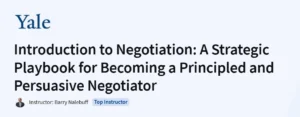What you will learn in Financial Markets Course
- Gain insights into the structure and function of financial markets.
- Understand risk management and the role of insurance in finance.
- Explore behavioral finance and how psychology impacts investment decisions.
- Learn about financial institutions, including banks, mutual funds, and hedge funds.
- Study key asset classes such as stocks, bonds, and derivatives.
- Analyze historical financial crises and their economic impact.
- Develop critical thinking skills to evaluate financial strategies.
Program Overview
Introduction to Financial Markets
⏱️ 3-4 weeks
- Understand the importance of financial markets in economic growth.
- Learn about market efficiency and the role of information in finance.
- Explore the connection between finance and public policy.
Risk Management and Behavioral Finance
⏱️ 4-6 weeks
- Examine risk management strategies and the role of insurance.
- Understand how investor behavior affects financial decisions.
- Learn about biases, herd behavior, and irrational market movements.
Financial Institutions and Instruments
⏱️ 5-7 weeks
- Study the role of banks, mutual funds, and hedge funds in global finance.
- Learn how financial instruments like bonds, stocks, and options work.
- Explore modern financial innovations and their implications.
Global Financial Crises and Market Stability
⏱️6-8 weeks
- Analyze historical financial crises and their causes.
- Learn how governments and institutions respond to financial instability.
- Study case studies of major market crashes and their long-term effects.
Final Assessment and Real-World Applications
⏱️8-10 weeks
- Apply financial principles to real-world economic scenarios.
- Explore financial planning and investment decision-making.
- Complete a capstone project or assessment to solidify knowledge.
Get certificate
Job Outlook
- Growing Demand for Financial Experts: Finance professionals are in high demand, with job growth expected in roles such as investment banking, financial analysis, and risk management.
- Competitive Salaries: Entry-level finance professionals earn $60,000 – $90,000 per year, while experienced analysts and managers can make $100,000+.
- Global Career Opportunities: Financial expertise is valuable in banking, corporate finance, fintech, and investment firms worldwide.
- Entrepreneurial Benefits: Understanding financial markets helps individuals make informed business and investment decisions.
- Advanced Learning Pathways: This course serves as a foundation for CFA, MBA, or other finance-related certifications.
Explore More Learning Paths
Deepen your understanding of finance and markets with these expertly curated programs designed to enhance your financial literacy, strategic thinking, and investment knowledge.
Related Courses
The Global Financial Crisis Course – Analyze the causes and impacts of financial crises and learn how markets respond under stress.
Financial Planning for Young Adults Course – Gain practical skills in budgeting, investing, and long-term financial planning for personal growth.
Financial Technology (FinTech) Innovations Specialization Course – Explore the evolving world of fintech, blockchain, and digital finance solutions.
Related Reading
What Is Wealth Management – Learn how wealth management strategies and principles guide investment and financial decision-making.
Specification: Financial Markets Yale University Course
|
FAQs
- Start by understanding the purpose of financial markets—asset trading like stocks, bonds, commodities, and their role in capital allocation
- Learn key market concepts: equities, bonds, derivatives, investment banking, market history, and financial crises.
- Choose structured, beginner-friendly courses with clear modules—Yale’s, for example, covers basics like insurance, CAPM, behavioral finance, and more.
- Use courses that combine video lectures with assignments and quizzes to reinforce learning.
- Explore supplementary sources like Investopedia for clear definitions and overviews of financial terminology and instruments
- Yes—many online options are accessible via platforms like Coursera. For instance, Yale’s course includes a shareable certificate and is part of Coursera Plus.
- Financial aid or free audit modes are frequently available, offering cost-effective access.
- Courses designed by top institutions like Yale (Robert Shiller) or University of Geneva offer both credibility and reputation.
- Short-duration formats—Yale’s course is 3 weeks at 10 hours/week—help keep costs and time investment reasonable
- Foundational concepts such as CAPM, behavioral finance, debt, inflation, stocks, bonds, and market cap dynamics.
- Historical perspectives: financial bubbles, recessions, the mortgage crisis, regulations, and their real-world implications.
- Key market functions: underwriting, brokerage, exchanges, investment banking, and innovators in market structures.
- Broader considerations like career context, institutional actors, and ethical dimensions of finance
- Yes—courses from recognized institutions like Yale add credibility and serve as a strong resume and LinkedIn addition.
Learner reviews and practical feedback:
“If you’re looking for intro knowledge … it can be advantageous.”
“I did this course for … 4 hours a day … the lectures were really interesting.”
Complex subjects may require more background—some learners suggested supplemental finance or economics study.
Overall, it’s seen as a solid foundation, especially for those new to finance
- Yale’s course runs approximately 3 weeks, with an estimated 10 hours per week commitment.
- The flexible format allows completion at your own pace—complete in a few days or spread over weeks depending on preference.
- Smaller programs, like Understanding Financial Markets from University of Geneva, offer a shorter option—1 week at 10 hrs/week





